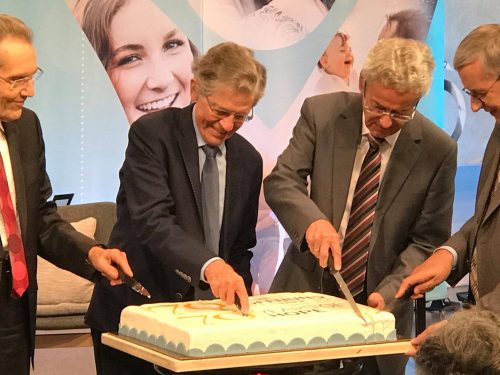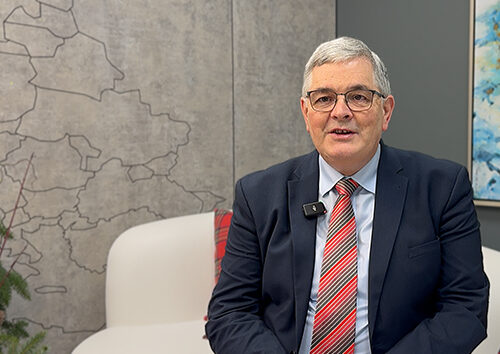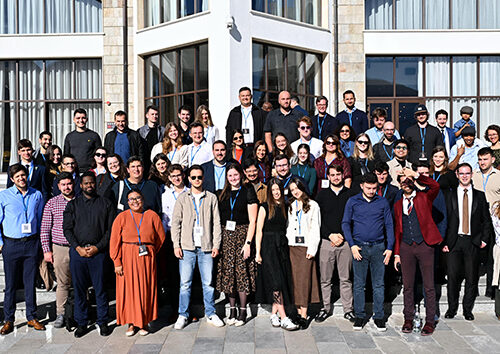20 September 2018 | Alsbach-Hähnlein, Germany [Victor Hulbert]
A personal reflection while attending the 70th anniversary celebrations for the establishment of the Voice of Hope (Stimme der Hoffnung) in post-WWII Germany – a time when ‘hope’ was a key word.
 It took about five decades, but I finally forgave my sister! I was about six years old when, as a punishment, she was sent to the bedroom to reflect on whatever wrongdoing she had been caught with. Instead of reflecting, she found my ‘dot-to-dot’ book and proceeded to fill it in. That, for me, was a heinous crime for which I felt she deserved a far more significant punishment.
It took about five decades, but I finally forgave my sister! I was about six years old when, as a punishment, she was sent to the bedroom to reflect on whatever wrongdoing she had been caught with. Instead of reflecting, she found my ‘dot-to-dot’ book and proceeded to fill it in. That, for me, was a heinous crime for which I felt she deserved a far more significant punishment.
Last year, redemption came. For my birthday she presented me with an extremely complicated dot-to-dot book for adults. It may take me until retirement or beyond to complete it!
Sometimes it takes a while to join up the dots. For me this happened in a spectacular way while visiting the German Voice of Hope (Stimme der Hoffnung) during their 70th anniversary celebrations.
![Stimme-der-Hoffnung media centre [photo credit: Victor Hulbert] Stimme outside](https://ted.adventist.org/sitenews/wp-content/uploads/2018/09/images_news-2018_Stimme-outside-scaled.jpg) Formed in 1948, just after WWII, and at a time when ‘hope’ was very much in demand, particularly interesting developments of their radio work were the recordings they made for shortwave broadcast from transmitters based in Sines, Portugal. Those programmes were then aired back into East Germany at a time when Christianity was severely restricted in the Eastern Block.
Formed in 1948, just after WWII, and at a time when ‘hope’ was very much in demand, particularly interesting developments of their radio work were the recordings they made for shortwave broadcast from transmitters based in Sines, Portugal. Those programmes were then aired back into East Germany at a time when Christianity was severely restricted in the Eastern Block.
Thirty-one years later I found myself as a volunteer in Portugal as Adventist World Radio’s first student missionary. Among my tasks, I helped compile the tapes in various languages for broadcast back across the Iron Curtain to Germany, Poland, and as far east as Russia. Another of my responsibilities was responding to listeners and a phenomena at the time known as QSL cards.
 QSL’s originally started in the world of amateur radio but rapidly developed with a breed of listeners who tried to listen to far off and obscure radio stations. They would then write to the station with a reception report listing, beyond their geographical location, signal strength, any interference and some details to prove they had heard the programme.
QSL’s originally started in the world of amateur radio but rapidly developed with a breed of listeners who tried to listen to far off and obscure radio stations. They would then write to the station with a reception report listing, beyond their geographical location, signal strength, any interference and some details to prove they had heard the programme.
For a religious broadcaster, this was often a way to introduce listeners to Christianity – and it worked. Sitting in the Stimme studio with around 200 guests on Sabbath, 15 September, my heart warmed as a story was told of a gentleman who not only found faith through those broadcasts, but in developing a relationship with someone in the listener-mail service, fell in love and married.
Technology has changed. My shortwave radio is in the attic. QSL cards no longer exist. The internet has radically changed viewing and listening habits – and even the skills and interests of hobbyists. But 70 years on, ‘hope’ is still the core of the Adventist message. Scratchy signals on shortwave radios may have transformed into podcasts, satellite signals, YouTube videos and social media, but Adventist communicators are still working hard to ‘join the dots’ for the millions who have not yet found the connection between their life and that of a wonderful Saviour who transforms lives and consistently provides hope.
Volunteering to working with Adventist media in the 1970’s transformed my life. At Stimme I was reminded how that media is continuing to transform the lives of so many others.
Find out more about Stimme der Hoffnung by visiting their website.
SEE ALSO:
70 Years broadcasting Hope in Germany and beyond.
Adventist World Radio
Hope Channel
Reflections – a series of personal devotions from Victor Hulbert
Reformation Journey – a modern media series developed from the concepts learnt in Student Missionary days.
tedNEWS Staff: Victor Hulbert, editor; Sajitha Forde-Ralph, associate editor
119 St Peter’s Street, St Albans, Herts, AL1 3EY, England
E-mail: [email protected]
Website: www.ted.adventist.org
tedNEWS is an information bulletin issued by the communication department of the Seventh-day Adventist Church in the Trans-European Division. Readers are free to republish or share this article with appropriate credit including an active hyperlink to the original article.



